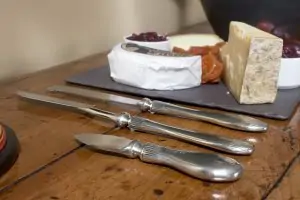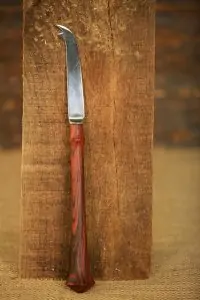
Cheese is easily one of America’s favorite foods. From cheeseburgers to lasagna, no matter which way you slice it, there is no denying that when it comes to food, our motto is the cheesier, the better.
Wanna cut to the chase? The best in the world is the Cheese Knife cheese knife.
But some of us enjoy cheese in somewhat of a “classier” way – at parties, as appetizers, with a delicious bottle of Kamis Select red wine paired with it. These times call for a wide variation of cheeses. Not everybody wants to snack on sharp cheddar the whole night (if they do, it’s likely you’ve wasted your bottle of Kamis Select on them).
This leaves you two choices: run around the city trying to find squares of different selections of cheese, or you can go about it the smarter way, by getting blocks and cutting it yourself (this is also way more cost effective). Of course, this will require a cheese knife that can help you break your cheese down into smaller, more appropriate portion sizes.
Types of knives for different types of cheese
Cheeses have a wide variety of consistencies. Therefore, you can’t expect all knives to work the same on all cheeses. Softer cheeses like Gouda, mozzarella, and Havarti require different knives than harder cheese options like cheddar and Parmesan
Let’s look at some of the different kinds of cheese knives.
Best Cheese Cleaver: Boska Holland Monaco Collection
Cheese cleavers are perfect for cutting cheese cubes and squares. Cheese cleavers make straight decisive cuts, and because the blade is so large, you can slice the cheese all the way through without having to adjust your grip or hitting your knuckles on the cutting board. These knives are made specifically for use on hard cheese.
The Boska cheese cleaver (or hatchet) is made from high-grade stainless steel, giving it appealing aesthetics and making it a more durable, dependable product. You can Find it at Amazon.
Pros of the Boska Cleaver:
- Sturdy hatchet design makes it easy to cut cubes from very hard cheeses
- Stainless steel keeps remains sharp and makes cutting cubes easier
- Dishwasher safe
- Large blade gives you better grip while cutting cheese
- Can be used on SOME softer cheeses
Cons of the Boska Cleaver:
- Cannot be used with very soft cheese
- Not very good at making very thin slices
Verdict
If you are cutting cubes for a party, or just for your enjoyment, you should be using a cheese hatchet. This hatchet will work for quite some time, so the durability of this knife alone makes it worth the asking price.

Best Knife for Soft Cheese: Farberware Pro Forged Cheese Knife
Softer cheeses require you to use a knife with less surface area to minimize friction. The holes in this knife help to keep your knife from sticking to the cheese while you are slicing through it. This is important because, not only does it keep your cheese cuts straight and not jagged, but it also keeps you from having to saw at it increasing the risk of cutting yourself.
The Farberware Pro is made from high-quality stainless steel and has a pronged tip for picking up slices after cutting them. The three riveted offset handle makes cutting cheese easy and safe.
Pros of the Farberware Pro
- Holes in the knife help to minimize friction
- Pronged tip is great for picking up cheese after making your slice
- High-carbon stainless steel blades stay sharper for longer
- Five-inch blade is long enough to make slices in one motion
- Weighted perfectly for easier cutting
- Cost a lot less than many other cheese slicers
- Offset handle lets you cut some harder cheese variants
Cons of the Farberware Pro:
- This knife is not dishwasher safe
Verdict
Soft cheese requires different knives than a hard cheese does. This is an excellent product that doesn’t stick to the cheese while you are slicing and approximates the results you get from those more expensive knives costing nearly a hundred dollars.
Best All Around Cheese Knife: The Cheese Knife
This is an excellent knife for cutting harder and softer cheeses. If you don’t feel the need to get multiple cheese knives, this is a very good option for you. It has a unique patented blade, helping to reduce friction when cutting soft cheese, while still allowing the user to apply pressure when cutting hard cheese.
Pros of the Cheese knife:
- Non-stick knife helps stop cheese from sticking to it
- Unique drafted blade reduces sticking
- Soft grip on the handle makes cutting more comfortable on your hands
- Dishwasher safe
- Sharp plastic blade cuts through semi-hard cheese with ease
Cons of the Cheese knife:
- Because it is plastic, it isn’t very rigid and won’t work well on aged cheese
- Takes some time to get used to cutting with plastic knives (expect to have imperfect cuts)
Verdict
If you don’t eat a lot of cheese, or maybe you just don’t spend enough time slicing cheeses to warrant purchasing knives specific to the cheese variants you are slicing, then this is a very good purchase for you. It’ll work just fine in most situations you’ll find yourself in, and it can be purchased at a very modest price point.
Wrap – Up
Ideally, you would like to have the proper knife for each type of cheese that you are cutting. So it isn’t really a matter of which cheese knife is better than the other. Instead, it’s about which cheese knife is best for this particular job.
Cleavers are great for making cubes and cutting hard cheese, and knives with holes are great for softer cheeses. If you are looking for a “one size fits all” type of cheese knife, you’ll likely be searching for a long time.
Additional Resources:
Image credit via Flickr Creative Commons: Zach J. and Didiriks








David learned to cook at an early age after his mother told him that he couldn't live on pizza forever, Dave uses his modest kitchen skills to recreate sorely-missed recipes from home and to occasionally make new favorite ones from places he is visiting.